- M.A
- Rug & Carpet
- 8744 views
- 5 comments
When you discover that some colors have started to run or bleed from your prized Persian rug, you may feel anxious. Color bleed is not what you expected after spending a significant amount on the rug.
The first thing you should know is that color bleeding is not at all unusual in Persian rugs. Because of their construction and materials, these rugs tend to bleed a little. This is not something to worry about, but there are things you can do to reduce the bleed to keep your handmade rug looking as bright and colorful as the day you bought it.

What Is Carpet Bleeding?
Many Oriental rug owners experience carpet dye bleeding, dye transfer, or dye migration during cleaning. When it happens, there is no argument that it does cause frustration and disappointment, especially when you have invested a lot of money in your oriental rug (not to mention the time you spent searching) for the perfect rug for your space. There are different types of oriental rugs you can buy, but if you have red, off-white areas, the reality is the colors will maybe bleed into each other when the oriental rug.
Many of you may be wondering what dye bleeding is. Dye bleeding or dye migration occurs when a colored fiber loses dye while wet. Uncolored or light-colored fibers may take on unwanted color from darker ones if they get wet. This is often seen in rugs where deeply dyed shades such as red, blue, and black become fugitive and bleed into light-colored areas.
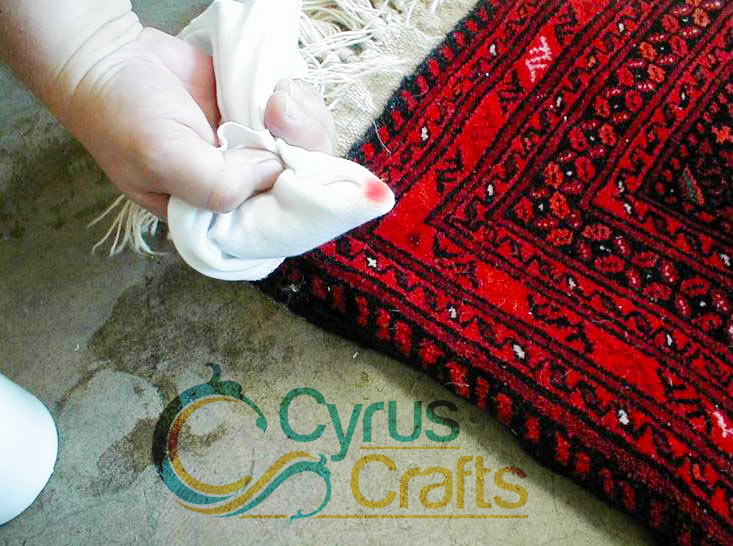
What Causes Carpet Bleeding?
There are different scenarios for a Persian wool rug, which is among the most expensive and valuable types of rugs, where its darker dyes have run into the neighboring off-white areas. Here are the most probable causes for that.
Fugitive Dyes Cause Dye Migration.
Fugitive dyes occur due to improper exposure to water from a flood or a poor cleaning attempt. Further, when carpets are over-dyed, fugitive dyes can result. Rug dealers use this technique to make a rug look brighter, older, or more antiqued.
Cyrus Crafts; Luxury & Unique Products
Excess Dye or Over-Dyed Cause Dye Transfer
If a rug has not been cleaned before, the excess dye might be washed out of the fibers during the first cleaning. Further, if an additional color has been added to a rug to make it look brighter or to make it look older (called tea washing to make a rug look antiqued), this additional dye can bleed during cleaning.
New rugs may have an unsightly excess of dye in their fibers. This is normal. This wool is very thoroughly dyed with those beautiful colors, and just as with new sweaters in the laundry, some dye comes off in the first cleaning.
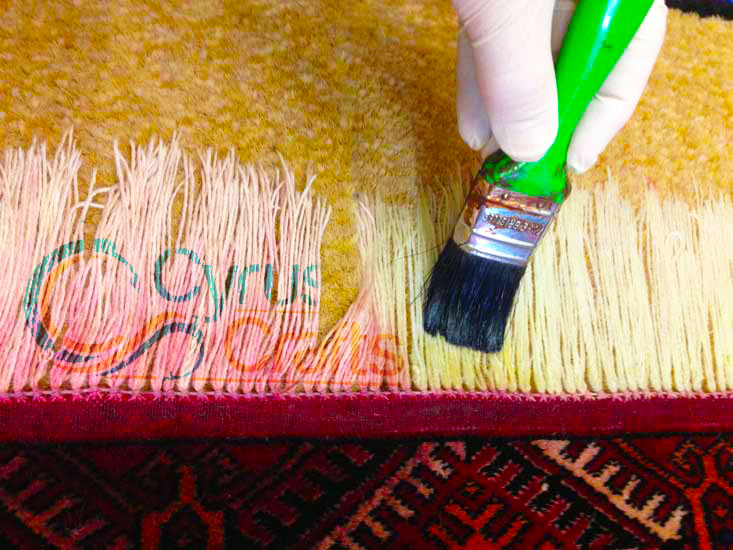
In-Home Cleaning of Rugs Cause Dye bleeding
Having your rug cleaned in your home is the amount of residue left behind in the fibers after the “cleaning”. Chemical residue builds up and, over time, can affect the acid dyes in the rug. This is especially true of wool rugs. As a result, this can cause the dye to bleed out of your rug. While it might clean well one or two times in the home, on the third clean, the dyes can bleed due to the residue not being appropriately removed.
This is why you should never have a rug cleaned at home. Always take your rug to a professional cleaner where it can be appropriately cleaned and dried.
Pet Stains May Cause Carpet Bleeding
When it comes to rug bleeding, pet urine is a serious problem. Pet urine causes acidic stains that become alkaline over time. If it isn’t professionally cleaned as soon as possible, pet urine will cause long-term, permanent dye damage to your rug. The result is that even if a rug has colorfast dyes, all areas exposed to urine will bleed, no matter what steps are taken.
This is why pet urine is the most dangerous “spill” you can have on your rug. And why you need to have it cleaned as soon as you discover. The more time you take to inspect your rug, the more problems you can avoid.
How to Know if a Carpet Will Bleed Color or Not?
To make sure that the area rug you are buying has color migration or not, it is necessary to show it to an expert in oriental carpets. A specialist will thoroughly inspect your rug, which is an essential step in the dye migration test. This process involves testing the rug’s pH level and checking for dye transfer, which can result in discoloration. A white rag rubbed gently over the surface of the carpet can detect whether or not the dye is bleeding. This means the dyes are “homeless”, aka the rug has been over-dyed or the dyes have not been set properly in the fiber and can move rather easily to other areas of the rug. The next step is to try cleaning it with a special solution made for rugs like yours. This will identify if your rug has a bleeding concern, which is easier to control, and the more common the dye migration problems.
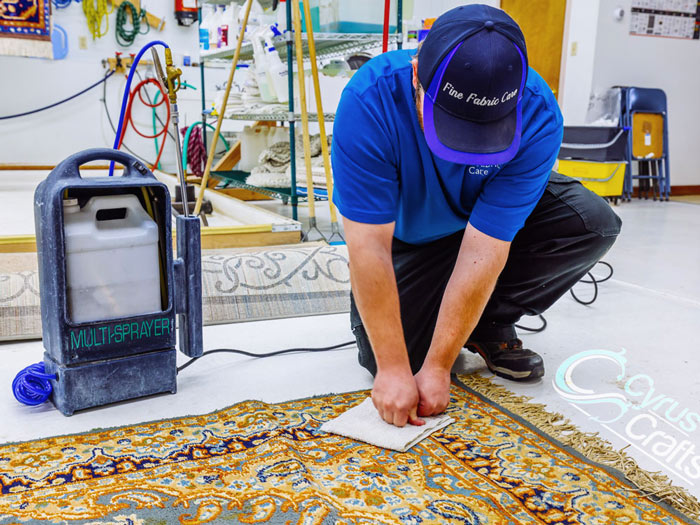
How to control and fix carpet bleeding?
You can use the following methods to remove dye bleeding:
Removing Carpet Bleeding with Sour Yogurt
Combine sour yogurt with water and hydrosulfite solution and apply with a zinc brush to the bleeding part of the carpet. With this, you can easily fix your carpet. It is recommended that you first try this work on the part of the carpet, for example, to test the uniformity of the color of the carpet and the chemicals used in it.
Clean Bleeding mat and Fixing Carpet Bleeding with Paint Removal
The problem of carpet bleeding will be solved if it is entrusted to reliable carpet cleaners and experts. In fact, using the color removal method in carpet cleaning will make the colors of your carpet look like the first day.
How to Prevent Carpets from Bleeding?
- Refrain from spreading your carpet to direct sunlight because it causes the color of the carpet to blend.
- After washing the Persian carpets, do not hang them because this causes water to pass through the carpets' fibers, and the carpet's colors interfere with each other.
- Never use hot water to wash the oriental carpets because it will damage the color of the carpets.
- Leave your carpets at reputable centers of carpet cleaning in Canada or USA. because the wrong way of washing the Persian carpet and using low-quality detergents will damage the color of the carpet and turn your carpet yellow.

Color runs and color bleeding happen to handmade Persian rugs, but it is not the end of the world. Leave a comment below, and let's talk with Cyruscrafts to discuss any concerns you have and options for a rug that has experienced color bleeding.
CyrusCrafts Rugs Chain Sore: Canada and the USA
CyrusCrafts Canada and the USA are seriously pleased to show you the evolution of Persian rug chain stores in North America. The mission has always been to bring beauty and craftsmanship of the most exquisite Persian carpet to homes and offices and we are glad we have done this in several key locations.
CyrusCrafts Toronto, Ontario Online Rug Store
Since we opened our store a couple of years ago, people who are interested in rugs and handicrafts in Toronto, Ontario. We offer an enormous stock of Persian rugs, Kilim rugs, runner rugs, and vintage rugs in Toronto that match every individual preference.














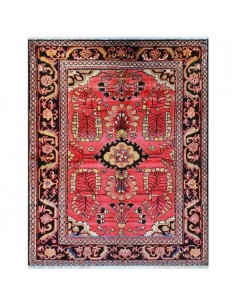

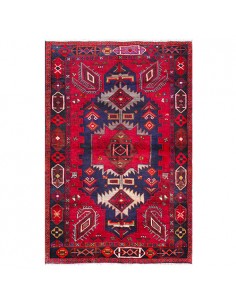

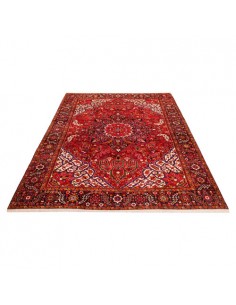

Comments (5)